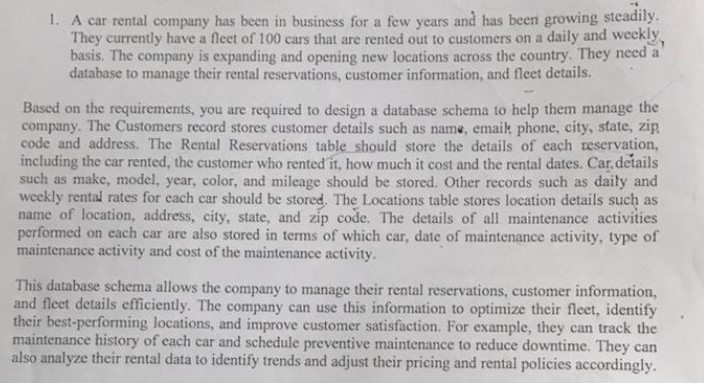

Dealing with limited rental car availability is a significant challenge for businesses that rely on car rentals for employee travel or client engagements. Imagine a critical meeting that falls through due to an unexpected shortage of rental cars! This crucial issue demands a proactive and adaptable approach to keep your company operating smoothly. This article discusses practical strategies and solutions for companies facing limited rental car availability. We will explore preventative measures, alternative transportation strategies, and considerations for long-term solutions. The structure of the article will cover identifying the problem, outlining preventative measures, exploring alternative transportation options, and discussing long-term solutions.
Identifying the Problem: Limited Rental Car Availability
The Ripple Effect of Scarcity
Limited rental car availability can disrupt operations, potentially leading to significant financial losses and impacting project timelines, especially for businesses heavily reliant on car rentals. Companies often discover that, during peak periods or in specific geographic areas, there’s a sudden and unexpected shortage of rental cars. This can manifest in delays, cancellations, and increased costs. A sudden need for multiple cars for a business trip can often prove problematic. A lack of appropriate transportation can also significantly disrupt client meetings, damage reputation, and lead to lost revenue. Without swift and appropriate solutions, the problem can have serious consequences, potentially leading to reputational damage and lost opportunities.
Understanding the Causes
Several factors contribute to fluctuating rental car availability. High demand during peak seasons, unexpected events like natural disasters or major events, and maintenance or operational issues can disrupt rental car supply. Sometimes, external factors, such as accidents or incidents affecting suppliers, are beyond immediate control. Fluctuations in the rental car market, including increased demand, may affect availability in specific locations or during particular times of the year. Understanding these causes will help businesses develop proactive solutions and adapt to changing market conditions.
Implementing Preventative Measures
Proactive Booking Strategies
Proactive booking strategies are crucial for preventing problems associated with limited rental car availability. Employing a system of pre-booking well in advance is essential. Establishing a clear and systematic process for booking rental cars well ahead of anticipated travel needs is key. By implementing a system that automatically sends out reminders, it encourages employees to reserve their rental cars in advance. This reduces stress and improves overall efficiency. During periods of high demand, consider using third-party rental aggregation services to monitor availability and quickly identify alternate options.
Diversifying Rental Agencies
Diversifying rental agencies is a powerful way to hedge against shortages at one specific agency. Partnering with multiple rental car providers allows your company to have options if one agency has limited vehicles. This redundancy reduces the likelihood of delays and cancellations. Furthermore, compare pricing and services from different agencies to ensure cost-effectiveness and consistent high quality service.
Exploring Alternative Transportation Options
Utilizing Public Transportation
Consider evaluating the feasibility of utilizing public transportation as an alternative. It may be suitable for shorter distances or when budget constraints limit choices. Evaluate the practicality of using public transport for specific routes and timeframes, especially in areas where robust public transportation is available. This can significantly reduce costs compared to renting cars for all employees, especially if multiple employees are travelling to the same location. Public transportation often serves as a practical and cost-effective alternative to relying solely on rental cars.
Implementing Ridesharing Solutions
Ridesharing services like Uber and Lyft are another viable option to address car rental shortages, particularly for point-to-point travel. For employees who require flexibility in terms of location and time, this offers a convenient alternative to traditional rental cars. Analyze the feasibility of implementing a rideshare program for company travel. Evaluate costs, suitability for different travel needs, and potential logistical challenges. This option may prove more practical and cost-effective in certain situations than traditional rental car options.
Long-Term Solutions for Business Continuity
Creating a Comprehensive Travel Policy
Establish a robust and adaptable travel policy for your company that addresses fluctuating rental car availability. This policy should explicitly detail how limited availability impacts company travel procedures. Include specific instructions for alternative transportation options, proactive booking requirements, and the procedure for handling unforeseen shortages. This is a critical step to mitigate potential disruptions. Ensure this policy is clear and easily understood by all employees.
Investing in a Company Fleet
An option worth considering for long-term sustainability is to develop a company fleet. A company fleet guarantees the ability to provide transport whenever necessary, especially if long-term travel is a key component of your company’s operations. Evaluate whether it is financially viable and whether the investment in cars will contribute to company productivity and cost savings. Consider the size of your fleet and the vehicles needed to meet your company’s varied transportation needs.
Analyzing Market Fluctuations
Tracking Market Trends
Staying updated on market trends and trends specific to your company’s travel requirements is essential. Develop an understanding of the rental car market to better predict future demand fluctuations and potential rental car shortages. Utilize data analysis tools, industry reports, and news sources to stay informed. This knowledge is vital to proactively address challenges related to car rental availability.
Adapting to Changing Conditions
The rental car market is dynamic; be prepared to adapt to changing market conditions by regularly reviewing and updating your strategies for rental car availability. Maintain clear communication with your rental agency partners and consider implementing flexible travel policies to ensure business continuity. Regularly assess the effectiveness of your current strategies and refine them as needed to address potential future issues.
In conclusion, navigating limited rental car availability for your company requires proactive planning, alternative solutions, and adaptable strategies. By employing the tactics discussed in this article, your company can minimize disruption, optimize operations, and safeguard your business continuity. Prioritize transparent communication with staff and clients, explore alternative transportation options, and continuously monitor and adapt to changing market conditions. Remember to consider the long-term implications of limited availability and plan accordingly. Explore car rental solutions, such as reserving in advance, and considering car-sharing services. If you are struggling to find suitable rental cars, seek professional consulting to develop a comprehensive solution tailored to your business needs.